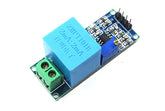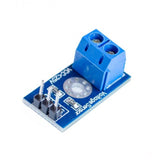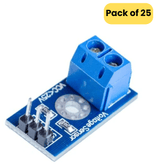Understanding Voltage Sensors
Summary
Discover the fascinating world of voltage sensors in our latest blog! From understanding the fundamentals of voltage sensors to exploring different types and their pros and cons, this article is a must-read for electronics enthusiasts and professionals alike. We delve into the intricacies of voltage sensor technology, including contact and non-contact variants, and compare their features in an easy-to-read comparison table. Whether you're a beginner or an expert, this informative and engaging piece will empower you to make informed decisions when choosing the right voltage sensor for your specific needs. Click here to explore the electrifying realm of voltage sensors and unleash their potential!
What is Voltage sensor?
Voltage sensors are also called voltage detectors or voltmeters. They are primarily used to measure and monitor the potential difference a.k.a voltage between two points in an electric circuit. They are used in many industrial, commercial and household applications. There are various types of voltage sensors, the most common ones are listed below:

Voltage sensor types
Resistive Voltage Divider:
A resistive network is used to divide the input voltage and an output voltage is provided proportional to the input.
Capacitive Voltage Divider:
They are very similar to resistive voltage dividers; the only difference is the usage of capacitors in place of resistors to divide the input voltage.
Hall Effect Sensor:
The fundamental principle of Hall effect is used to measure the voltage by these sensors as indicated by their name. The changes in magnetic field are detected by the sensor caused by the voltage and are converted into a proportional electrical signal.
Electrostatic Voltage Sensor:
The voltage is measured based on the principle of electrostatic induction. The electric field generated by the voltage is detected by the sensor and they convert it into an electrical signal.
Piezoelectric Voltage Sensor:
As the name clearly shows that these sensors use piezoelectric effect to measure voltage. The mechanical stress caused by the voltage is converted into an electrical signal by this sensor.
Optical Voltage Sensor:
Optical voltage sensors use optical methods to measure the voltage. The changes in voltage are converted to optical signals by these sensors.
Inductive Voltage Sensor:
They use the principle of electromagnetic induction to measure voltage. Changes in magnetic field caused by the voltage are first detected and then converted into electrical signals.
Fiber Optic Voltage Sensor:
Fiber optic cables are used to measure voltage. Fiber optic phenomena like Faraday effect are used to convert the voltage into optical signals which are the detected and measured as per the needs.
Visit our Sensors collection page for popular brands.
Voltage sensors Comparison Table:
|
Voltage Sensor |
Measurement Range |
Accuracy |
Output Type |
Interface |
Power Supply |
Features |
|
Resistive Divider |
0-10V, 0-20V, 0-50V, etc. |
±1% to ±5% |
Analog |
None |
External Power Supply |
Simple and low-cost |
|
Capacitive Divider |
0-10V, 0-20V, 0-50V, etc. |
±1% to ±5% |
Analog |
None |
External Power Supply |
High input impedance |
|
Hall Effect Sensor |
0-50V, 0-100V, 0-500V, etc. |
±0.5% to ±2% |
Analog or Digital |
None or PWM, I2C, SPI |
5V DC or 12-24V DC |
Contactless sensing |
|
Electrostatic Sensor |
0-100V, 0-200V, 0-1000V |
±1% to ±5% |
Analog |
None |
External Power Supply |
Non-contact measurement |
|
Piezoelectric Sensor |
0-10V, 0-20V, 0-50V, etc. |
±0.5% to ±2% |
Analog |
None |
External Power Supply |
High sensitivity |
|
Optical Sensor |
0-100V, 0-200V, 0-1000V |
±0.2% to ±1% |
Analog or Digital |
None or Modbus RTU |
24V DC or 110-220V AC |
Immune to electromagnetic interference |
|
Inductive Sensor |
0-50V, 0-100V, 0-500V, etc. |
±1% to ±5% |
Analog or Digital |
None or 4-20mA, Modbus |
12-24V DC or 110-220V AC |
Suitable for harsh environments |
|
Fiber Optic Sensor |
0-100V, 0-200V, 0-1000V |
±0.2% to ±1% |
Analog or Digital |
None or Modbus RTU |
24V DC or 110-220V AC |
High isolation and immunity |
Pros and Cons of each sensor
|
Voltage Sensor |
Pros |
Cons |
|
Resistive Voltage Sensor |
1. Simplicity |
1. Loading effect on the measured circuit |
|
|
2. Wide range of applications |
2. Limited accuracy |
|
Capacitive Voltage Sensor |
1. High input impedance |
1. Sensitivity to stray capacitance |
|
|
2. Minimal loading effect |
2. Limited accuracy at low voltage levels |
|
Hall Effect Voltage Sensor |
1. Non-contact measurement |
1. Affected by magnetic field disturbances |
|
|
2. Wide dynamic range |
2. Limited accuracy and linearity |
|
Electrostatic Voltage Sensor |
1. Non-contact measurement |
1. Sensitive to environmental conditions |
|
|
2. Wide frequency response |
2. Limited accuracy and linearity |
|
Piezoelectric Voltage Sensor |
1. High sensitivity |
1. Limited dynamic range |
|
|
2. Fast response time |
2. Sensitivity to temperature changes |
|
Optical Voltage Sensor |
1. Non-contact measurement |
1. Sensitive to ambient light conditions |
|
|
2. High immunity to electromagnetic interference |
2. Limited accuracy and linearity |
|
Inductive Voltage Sensor |
1. Non-contact measurement |
1. Affected by magnetic field disturbances |
|
|
2. High immunity to electromagnetic interference |
2. Limited accuracy and linearity |
|
Fiber Optic Voltage Sensor |
1. Non-contact measurement |
1. Limited availability and higher cost |
|
|
2. Immune to electromagnetic interference |
2. Limited accuracy and linearity |
Conclusion
Voltage sensors are indispensable components in the realm of electrical engineering. They allow us to measure voltage levels accurately and safely, facilitating efficient control and monitoring of electrical systems. By understanding the various types of voltage sensors and weighing their pros and cons, you can select the most suitable sensor for your specific needs, ensuring optimal performance and safety in your electrical applications.
If you appreciate our work don't forget to share this post and leave your opinion in the comment box.
Please do check out other blog posts about Popular electronics
Make sure you check out our wide range of products and collections (we offer some exciting deals!)








